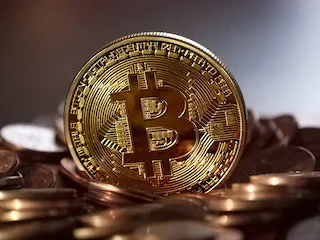
Beware of crypto-currencies and other 'revolutionary' ideas
- Matthieu P.J.
- Personal development
- May 30, 2021
There’s a trend I’ve spotted around me for some time now: a certain excitement around crypto-currencies, especially bitcoin. I recently attended a conference with crypto-enthusiasts and I have to say I was not impressed; and if the intention was to persuade me to buy into the crypto-dream, it did quite the opposite.
I’d like to issue a warning in this article; a triple warning in fact: against naivety, stupidity and greed. What you’ll do with that information is up to you, but I feel compelled to share.
Table of Contents
What is crypto-currency?
A crypto-currency (or just crypto) is a form of money that is only digital, which means without any physical form like cash. It is decentralised which means that unlike the traditional financial system we have, no central authority like a bank will hold records of the transaction. Instead, a technology known as distributed ledger will register and replicate the records of all transactions over the internet network. Because the information is available online, strong cryptography is used to secure the records hence the name ‘crypto-currency’.
Funny enough, I would say that crypto is rather cryptic! I am ready to take the bet that many people who have invested in crypto are ignorant of the underlying technology, blockchain, which allowed its emergence.
The most popular cryptos today is bitcoin, but that is not the only one. You may hear about others like: Ethereum, Litecoin, Cardano, Stellar etc. So bitcoin does not equal crypto, but because it was there first, it is often used as a synonym.
Why is crypto becoming popular?
All this enthusiasm around crypto has been largely fuelled by the astonishing profits some have made with bitcoins. Well, that is, especially those who invested in the early days. Indeed, if you had invested a few hundred dollars about 10 years ago you’d be sitting on millions of dollars today!
That sounds like a nice story, the kind of story you’d want to be part of. And that was enough for the legend to be born. Bitcoin became slowly mainstream and one day, you find a sign mentioning it in front of a convenience store just down your street! Yes, that’s what happened to me this week.

Beyond the potential for great profit, there are also the other arguments in favour of bitcoins that have been touted:
- The answer to the control of banks and governments over our finances because the system is controlled by everyone involved instead of a few
- It’s anonymous
- It’s secure
- It’s natively digital unlike our national currencies which are a legacy tool not fit for purpose anymore. Some people seem bothered about handling cash these days and are embracing the cashless society foretold by some. In that sense, crypto is for them.
But there is also a lot of uncertainty around crypto—and you’ll probably hear less about that.
The less-known issues of crypto
I will now talk about the dark side of crypto. For those who only know about the glamorous side, but have never bothered to read about the arguments against, it’s the section you don’t want to miss.
I’ll talk mostly about bitcoin in this section. First of all, cryptos are fairly new and many of the observations are derived from the 12 years of history we have with bitcoin (which is the eldest crypto out there). What is 12 years compared to the hundreds of years with traditional currencies? Not much, we should realise.
Cryptos are widely involved in illegal transactions (think money laundering).
I get the argument that the current financial system is controlled by the banks. I don’t find the situation fully satisfying either, but at the same time there is a beneficial aspect of this control. You probably don’t know this—unless you’ve worked in the financial industry—but there is a great deal of controls over money laundering and that is especially around the prevention of organised crime. At the same time, there are many regulations in place and the banks are accountable to government agencies that supervise them. This is not the jungle and completely on the loose like some would want to believe. There is no clear accountability I could identify in crypto e.g. bitcoin, and while it’s an argument for freedom I find it somehow disturbing.
Then there is the aspect of protection: if your credit card gets stolen, you can contact your bank and you will be covered for potential fraudulent transactions. With a system like crypto that does not allow to identify clearly the transactions, what can you do if you are being stolen? Well, not much it seems—and the case has already happened.
Next, I wonder if the very foundation of some cryptos may be flawed. It does not only take a smart technology to build something great. It’s also about the rules you set; about the system you design. Take bitcoin for example: did you know that it has a cap on the amount of bitcoins available? It means there can’t ever be more than a certain number of bitcoins (exactly 21 million). Which at the same time explains why the limited supply gives room to impressive fluctuations in its price. At the time of writing, one bitcoin was worth nearly £25,000! Traditional currency does not behave in that way, so we have no idea how this can turn out to be on the long run. At the heart of crypto is the blockchain technology which is surely smart and can be used in many applications. But that does not mean that the way it’s been implemented for bitcoin is the answer to all our problems!
Even more bizarre is the process called mining. I won’t get into the details, but essentially one of the ways to earn bitcoin is to provide computing power to the bitcoin network in order to solve equations. When you look rationally at it, mining is a ridiculous use of computing power and created—especially in the early days—a cottage industry of people operating computers to mine bitcoins and make money. I’m not an expert in the topic, but from what I can read I somehow get the awful impression that we have arrived at the end of ages if something as ridiculous as this has been allowed to take place.
Also, did you know that several regulatory agencies have issued investor alerts about bitcoin. There are two attitudes you can have upon reading those warnings:
- IGNORE THEM: These agencies are part of the oppressive system we live in, they do not have the best interest of the people at heart and are trying to prevent the introduction of new technologies that could free the people etc. You should not listen to them!
- LISTEN TO THEM: These agencies have the experience and credibility to issue such warnings and if they do so, people should listen carefully before making any investment. But, sure, many will go ahead anyway just like smokers have seen the unhealthy organs on the front of the packs of cigarets.
Many people are ready to overlook the issues I’ve mentioned above. But if you seriously consider them, you may realise for yourself that this bitcoin fever is pure madness.
Buyer beware
A sound advice for investors that has always stood true is that nobody should invest in something they do not understand. So I am asking: “do you understand bitcoin?”
The value of bitcoin is extremely volatile. That means that if you invest money, the value may go up a lot but may also go down a lot. This type of investment is called speculation. Yes, bitcoins and the likes seem to be the gold rush of the 21st century. There is a lot of mental energy being spent on this topic. It is totally irrational what is happening about it, yet it is happening and it’s not over yet. History teaches us this is not new and has happened before. That is called a speculative bubble. The tulip mania of the 17th century in Netherlands is a classic example of this phenomenon.
Speculation is not illegal, but it’s risky particularly if you don’t know that you are speculating. This bitcoin mania is a fascinating example of social psychology and irrational behaviours. It is fuelled by the firm belief that some money can be made, potentially a lot, and with no effort involved at all. Others have made money with it, so now many people want their share of the profits too! It gets personal: you heard your mate made some real money with crypto and you’re ready to jump on the bandwagon. It keeps going on and on.
But one day the music stops, and those who are still in the game can lose a lot—think about the musical chairs game. Crypto has activated some low energies in many people and many see it as a boon to increase their wealth. There is a name for that energy: greed.
At this stage, I believe bitcoin is a geek delusion. The technology is smart, granted, but does that mean this is the answer to the limitations of our current economic system? These are two different things. It will take more than just technology to sort out the issues of our economic system. Technology is an enabler, not an end in itself—I should know, I’ve worked in information technology for many years.
In an effort to find alternative ways to exchange money, it seems many have embraced bitcoin as the solution whereas it may just be a milestone towards a solution. Does that justify investing your live savings into it because it’s such a hot topic today? I see a looming disaster about crypto.
The real changes needed in the economic system
There needs to be changes in our economy. There are significant problems at the core of our financial system . But the topic is so complex and far reaching that such changes will take time and need to be thought through. The technology is not the issue here, it’s how it is used.
The real change that needs to happen in my opinion is about mentality. It is the energy of greed that corrupts a system. And ironically, this providential crypto model that is supposed to save us from the excess of finance has misguided many into a speculative mania—one of the most dangerous pitfalls in economy.
I have also observed that especially in the alternative communities, many have fallen into the trap of promoting a financial instrument they do not fully understand and I find it irresponsible. I’ve seen lots of deception recently; lots of false prophets; and false good ideas. The world is in turmoil at this time of covid madness and here are some vultures trying to make some quick bucks with a trendy topic by luring others into it. Oh I want to build a better world too, and see a better financial system emerge, better environmental management and respect of human rights and freedom etc. But I spend time researching and trying to understand what I am doing and where I spend my energy. Cryptos are a nice experiment at best but I do not see yet where they fit into our solutions. What I see is greed; people scared about the unpredictable future and trying to protect their money with a new type of asset although they do not understand it; and an irrational and excessive interest in something that is likely to just plummet in value sooner or later.
Change comes in many aspects of our life—and often is necessary—but that does not mean things should be rushed. In fact, they cannot be rushed. Our current monetary system has evolved over centuries and it’s not because some smart programmers figured out a way to decentralise financial transactions that we all ought to jump on the bandwagon and fuel the insane speculation we’ve observed with crypto in the recent years.
The human consciousness needs to change first before we can expect to solve our approach to money and economy. Designing a new system with the best interest of the species at heart is the key. For that, the roots of greed needs to be addressed and that is the real challenge.
Final thoughts
Bitcoin started around 2008 and made the headlines because of its incredible increase in value—especially since the beginning of the coronavirus crisis. The bitcoin mania is on! And as long as the music keeps playing, all will seem fine. But one day it will stop, and those who will still be in the game will have an awful after-taste in their mouth.
If anything, the crypto phenomenon highlights the ignorance of many about what financial investments are and—unfortunately—many may learn the lesson in a harsh way. The lack of financial education is what prevents the masses from identifying the serious risks of this highly speculative investment. Furthermore, in the context of a technology that is in its infancy. Once more, I am shocked at how gullible people can be: they do not understand something and yet they become involved. I see these online trainings sprouting about how to trade bitcoin and make a fortune and that makes me smile. I think it’s just a fad and this will pass.
Can you make money with bitcoin? Of course you can, many have and may still do today. But do you realise how volatile this financial instrument is? Probably not. Caveat emptor! Personally I would not invest £1 in crypto and I prefer to invest in assets in understand—and for which I feel some return on investment is fair. Playing the roulette with my savings is not my intention, if I ever wanted to feel the thrill of luck I’d go play at the casino.
At the conference I attended I heard a speaker saying “putting some of your wealth in cryptocurrency is a way to protect it from inflation”. I laughed inside. Nobody likes inflation, of course, but that goes with our current system. But, are you really serious about this: you’d rather risk a significant chunk of your money in a speculative investment rather than barely keeping up with inflation. I call that greed, not rational thinking or sound advice. Unfortunately I doubt many of the speakers actually had any experience with investing in the traditional sense at all. Although imperfect, our existing financial system is extremely complex and the emergence of an interesting technology does not signal its impending replacement. It is a global rethink of the system that needs to happen. Bitcoin and the likes are an isolated attempt to address the problem.
In a time of uncertainty as we’ve seen since over 12 months with the coronavirus crisis, crypto may be seen as a fantastic investment opportunity by the masses—but it’s simply not. Just like there has been madness about coronavirus, there is madness about crypto and we’ll see clear through that in due time.
Once more the reality is much more subtle than it appears at first glance. Do your research before you get tempted to spend some real money in crypto. And by all means, document yourself on what financial investments are because it’s what you don’t know that can hurt you the most. Bitcoin is a speculative bubble and you are at risk of losing a lot—or even all—of your money in it. You are now warned about the possible negative consequences of your actions.


